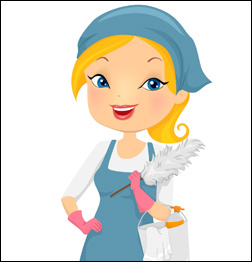The one who was
So yesterday The Legal Genealogist raised the spectre of a housekeeper who wasn’t keeping house at all.
At least not the way you or I might think of the term and the way it might be used here in the 21st century.
 No, “keeping house” in England or in colonial America was the act by a merchant or trader of hiding away behind the closed doors of his house to avoid having to answer to his creditors. It was an act of bankruptcy “committed when a trader absents himself from his place of business and retires to his private residence to evade the importunity of creditors.”1
No, “keeping house” in England or in colonial America was the act by a merchant or trader of hiding away behind the closed doors of his house to avoid having to answer to his creditors. It was an act of bankruptcy “committed when a trader absents himself from his place of business and retires to his private residence to evade the importunity of creditors.”1
So when we as genealogists run across a reference to keeping house in an old court record from England or colonial America, we have to think about a debtor who can’t pay his bills.
But that’s not the only way the term was ever used and, almost immediately after the post went live, reader LaBrenda Garrett-Nelson wondered about the way the term was used in an entirely different set of records we use as genealogists all the time.
“What about the phrase ‘Keeping house’ in the context of an 1870 census enumeration of a Black woman?” she asked. “Did it mean she was a ‘housewife,’ as we think of the word or that she was a domestic of some sort?”
Great question, and exactly the reason why it’s so important to understand the way the legal lingo was being used at a particular place and time.
And we’re very lucky that it’s easy to find out just what the term meant in the context of the 1870 census — because we can read the exact instructions that were given to the census takers.
In 2002, Jason Gauthier of the U.S. Census Bureau’s Economics and Statistics Administration produced one of the most singularly useful publications a genealogist can ever have in a toolkit. It’s now available as a downloadable PDF file, directly from the U.S. Census Bureau website, and it’s called Measuring America: The Decennial Census from 1790 to 2000.2
What makes this 148-page document so valuable is that it sets out, in detail, exactly what the census takers were told to do for each and every U.S. census from the first census in 1790 all the way up to the census of 2000.
Sure, we all know that the enumerator might not have done what he was supposed to do — but knowing what it was that he was supposed to do is often a real help in understanding the records.
And, in 1870, here’s what the instructions told the enumerator to do in entering the occupation of women on that set of census returns:
The term “housekeeper” will be reserved for such persons as receive distinct wages or salary for the service. Women keeping house for their own families or for themselves, without any other gainful occupation, will be entered as “keeping house.” Grown daughters assisting them will be reported without occupation.3
So where keeping house in colonial court records wasn’t at all what a housekeeper did, it really is what a housekeeper did in the context of the 1870 census.
SOURCES
- Henry Campbell Black, A Dictionary of Law (St. Paul, Minn. : West, 1891), 677, “keeping house.” See generally Judy G. Russell, “The housekeeper,” The Legal Genealogist, posted 15 Jan 2015 (https://www.legalgenealogist.com/blog : accessed 16 Jan 2015). ↩
- Jason G. Gauthier, Measuring America: The Decennial Census from 1790 to 2000 (Washington, D.C. : U.S. Department of Commerce, Economics and Statistics Administration, U.S. Census Bureau, 2002); PDF download, U.S. Census Bureau (http://www.census.gov/ : accessed 15 Jan 2015). ↩
- Ibid., PDF at 16. ↩



Another good source of census information is “Finding Answers in U.S. Census Records,” by Loretto Dennis Szucs & Matthew Wright. It has several pages of general census information, then 5 pages or so on each census, 1790-1930. It also contains a copy of each of the census forms and even a chart of the information requested on each of the censuses. (And I had to pay for it!) I’ll have to download the one in the post so I can get past the 1930 Census, now that later ones are slowly being released.
Anything Lou Szucs ever touches is worth having, Mary Ann!!
Judy,
I want to let you know that your blog post is listed in today’s Fab Finds post at http://janasgenealogyandfamilyhistory.blogspot.com/2015/01/follow-friday-fab-finds-for-january-16.html
Have a wonderful weekend!
Thanks so much, Jana!